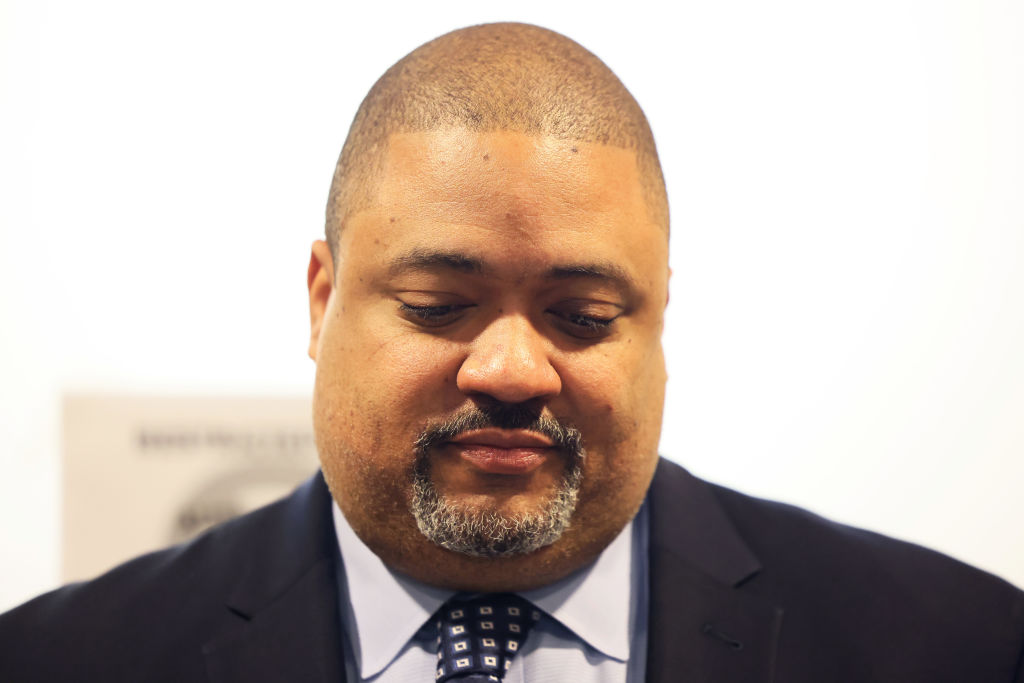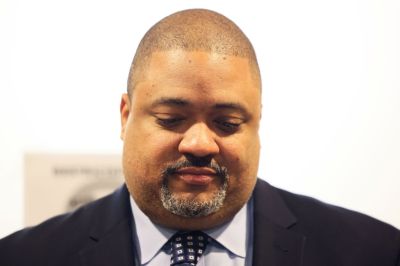In A Man for All Seasons, William Roper suggests he would “cut down every law” to get the Devil. Sir Thomas More responds, “Oh? And when the last law was down, and the Devil turned 'round on you, where would you hide, Roper, the laws all being flat?"
I'm not a particularly religious person, but I’m open to the possibility that Donald Trump is actually the Devil. Even so, the existence of the rule of law in our country is dependent on giving everyone its benefits. And that brings us to Manhattan District Attorney Alvin Bragg and his case against Trump. We have not yet seen the sealed indictment against Trump but I fear, in More’s words, that Bragg is ready to “cut a great road through the law to get after the Devil.”
Trump is reportedly facing 30-plus counts related to business fraud. Based on what we know from the grand jury, at least some of those counts will require the DA’s office to prove that Trump falsified business records when the Trump Organization labeled payments to adult film actress Stormy Daniels as a legal expense—and that Trump did it to hide or facilitate a federal campaign finance violation. For now, I will focus on this charge, which I believe sets a dangerous precedent and undermines our legal system.
Others have gone into great detail outlining why this charge—a state crime that relies on proving an uncharged federal crime that rests on a legal theory that has also been criticized as “murky”—has been met with so much skepticism by lawyers. But for the time being, let’s assume that this indictment strains the text and purpose of the law to reach actions we think are bad by a guy we know is bad. Would that be such a bad thing?
After leaving the Justice Department, I wrote that President Trump refused “to honor our most basic of values” as Americans, including the rule of law. But too many people who know better are willing to cheer on—or perhaps worse, stay silent—because they believe these charges target a man who deserves it.
It's easy to look the other way when the system fails to protect the people whose very existence we find loathsome. Many Americans must have wondered if British soldiers charged with killing American revolutionaries during the Boston Massacre needed lawyers to defend them, just as Americans later wondered if we really needed to give a parade permit to the Nazis who wanted to march in Skokie, Illinois. But I know my own rights are secure because even Nazis get the benefit of the First Amendment, and even our worst enemies get legal counsel (from John Adams, no less) to argue for their acquittal.
I’ve heard others say that this Trump indictment is like getting Al Capone for tax evasion. Except it’s not. Tax evasion is a widely prosecuted crime with specific elements. And Al Capone clearly committed it. The case against Trump more closely tracks with the approach of Stalinist goon Lavrentiy Beria: “Show me the man, and I'll show you the crime.”
Imagine if the Justice Department charged Trump with treason related to his retention of classified documents after the statute of limitations had run out on the actual crime related to the documents themselves. Sure, treason is a crime. Yet nobody has ever been charged with that crime because they held onto classified documents; the elements of treason would be stretched beyond their limits to achieve a desired outcome.
I am not suggesting that former presidents should be above the law, but they shouldn’t be below it either. No serious person has argued that a regular citizen has or would ever be charged under what appears to be New York’s novel legal theory being applied to Trump now—and certainly not seven years after the alleged crime was committed. Prosecutors may stretch the facts to indict people for more serious crimes or pressure them into a plea agreement, but stretching the law is more dangerous.
For non-lawyers, I can understand why this can all feel like justice—or as one of the Central Park Five called it, “karma.” Trump has spent years bending and breaking norms and calling for the baseless prosecutions of his political opponents. He has said repeatedly that any criminal charges brought against him are by definition baseless and the result of political persecution. He has encouraged his supporters in Congress to undermine the investigations against him at every turn. So what did he expect? He has dared prosecutors to indict him for years, and one is finally taking him up on the offer. It’s like a pitcher who throws a fastball at the head of a batter who keeps crowding the plate.
It is also true that Donald Trump will have the benefit of the legal system in this trial. As Nancy Pelosi said, Trump will have “the right to a trial to prove innocence.” But, of course, this is a profound misunderstanding of our system of justice. Our system assumes the innocence of the accused; the burden is on the prosecution to prove guilt beyond a reasonable doubt. But Trump will be able to fight these charges in court and put the prosecution to their burden in front of a jury of his peers. Even if convicted, he will be able to argue the legal merits of his case on appeal. Maybe he’ll be vindicated in a few years, and by then, hopefully, he will have lost his bid for president.
And perhaps all of that is beside the point if Trump is guilty of other crimes they haven’t been able to charge him with. If we frame a murderer whom we couldn’t convict for a robbery that he didn’t commit, a murderer is in jail so our society is safer. Is that really unjust?
Under our legal system, the answer to that question is emphatically yes.
The Constitution protects the guilty at the expense of society all the time. We exclude evidence of guilt when the police don't get a warrant. We don’t let juries hear a confession with details only the guilty person could know if the defendant wasn't given their Miranda warnings—something everyone already knows by heart. We don't do this to help free the guilty. We do it to protect the rule of law.
I hope the unsealed indictment will put all my fears to rest with a rock solid legal theory for a case that would have been brought against any other American. But when you stretch the law to bring charges against a person you think is guilty of being a bad guy, you undermine our entire system of justice. And the rule of law is more important than any one person. Even the Devil himself.
Sarah Isgur was the director of public affairs and special counsel to the deputy attorney general at the Department of Justice during the Trump administration. She is now host of the legal podcast Advisory Opinions, senior editor at The Dispatch, and an ABC News contributor.







Please note that we at The Dispatch hold ourselves, our work, and our commenters to a higher standard than other places on the internet. We welcome comments that foster genuine debate or discussion—including comments critical of us or our work—but responses that include ad hominem attacks on fellow Dispatch members or are intended to stoke fear and anger may be moderated.
With your membership, you only have the ability to comment on The Morning Dispatch articles. Consider upgrading to join the conversation everywhere.